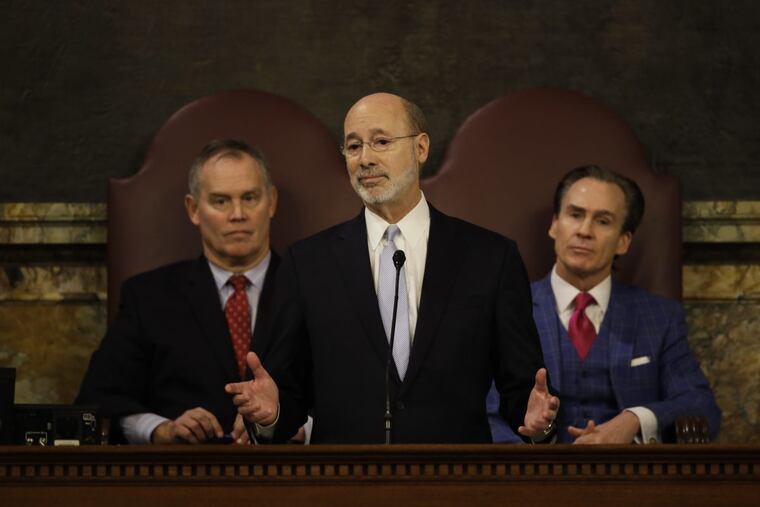With Pa. budget unbalanced, power struggle in Capitol - and maybe in court
He announced plans to borrow more than $1 billion, and just this week, ordered two state agencies to begin merging most of their duties.

HARRISBURG – In the face of the legislature's continuing failure to balance Pennsylvania's $32 billion budget, Gov. Wolf is taking unilateral action to finance and reorganize state government, raising political tensions and legal questions over the limits of executive authority.
That threatens a new battle over raw power, four months into a budget stalemate that seems to have no end.
"We are concerned about the separation of powers," Senate Majority Leader Jake Corman (R., Centre) told reporters Wednesday when asked whether Senate Republicans would sue Wolf over some of his recent decisions to balance the budget.
Steve Miskin, spokesman for Republicans who control the House of Representatives, put it this way: "You can't just say, to heck with the Constitution, to heck with the rule of law, to heck with people, I'm doing it my way because I know best."
Wolf administration officials counter that the governor has been left with little choice. Some in the GOP legislature, they say, are paralyzed by partisan politics — Wolf is a Democrat — and have failed to complete the most fundamental responsibility of their job.
That failure, said Wolf's budget secretary, Randy Albright, has already led to a downgrade in the state's bond rating. He said the governor cannot stand by and allow further erosion to the state's fiscal standing.
"The governor waited [for months], and if you wanted to find fault you could say we waited too long," said Albright, adding: "We were very careful and deliberate that any action or steps we take now and in the future are within our executive authority."
As it stands, Pennsylvania has only a partial budget: The legislature in late June approved a $32 billion spending plan, but without a proposal for how to pay for it or a way to close a gaping $2.2 billion deficit.
Within the last two weeks, Wolf has announced that he would borrow more than $1 billion to plug the deficit and use revenues from the state-run Liquor Control Board to pay for it. He is pursuing a separate borrowing strategy, involving the Pennsylvania Farm Show Complex and Expo Center in Harrisburg, to raise another $200 million.
And just Thursday, his administration announced it was advancing a "memorandum of understanding" (MOU) to merge many of the resources and functions of the Department of Corrections and the Pennsylvania Board of Probation and Parole — a move that, until now, was being pursued by the legislature.
"General Assembly inaction does not then legally permit the Gov office to merge departments by MOU which actually takes a law to do just that," Drew Crompton, the top Republican lawyer in the GOP-controlled Senate, wrote in an Oct. 19 tweet as word of the merger spread.
In an interview last week, Crompton said that each of Wolf's actions raised a different set of legal questions. But fundamentally, he said, "there is always danger when one branch ventures into the area of another."
"It upsets the foundation of power," he said. "That's significant. Perhaps not to people on the street. But I've waxed poetically before on the brilliance of our founders — they were very cautious in what they put in the three branches."
The state Constitution is clear on this: It requires a balanced budget and contains language that puts the burden on both the legislature and the administration to ensure that happens.
What it doesn't spell out is how far the executive branch can reach when making decisions on balancing the books on its own when the process breaks down. That is where disagreements have festered.
For months, as budget talks have stalled, tax-averse Republicans in the House of Representatives have argued that Wolf must freeze or cut spending. The governor instead has asked for and received a series of short-term loans from the state Treasury to keep paying the bills on time and push out subsidies for public schools and health care benefits for the poor, among other services. All the while, he has demanded that the legislature pass a revenue plan to pay for the $32 billion in spending it approved.
"Cutting is not the only tool we have as the executive," said Albright.
That decision could lead to a court battle.
Corman, the Senate's majority leader, did not rule out suing over the administration's decision to use revenues from the LCB — a state-run agency that many Republicans have tried for years to privatize — to pay down a loan.
And they have sued Wolf before over balance-of-power issues, including one case that went to the state Supreme Court. In that matter, Senate Republicans successfully argued that Wolf overstepped his authority when he fired the Office of Open Records chief weeks after taking office.
Still, when it comes to the budget, all sides say they would prefer to avoid costly litigation.
Albright, for one, said the administration was heartened by the legislature's move last week to approve a number of budget-related bills.
"We are always very sensitive about those kinds of institutional balance-of-power issues," he said, adding: "We don't want to preclude the General Assembly from taking additional steps."